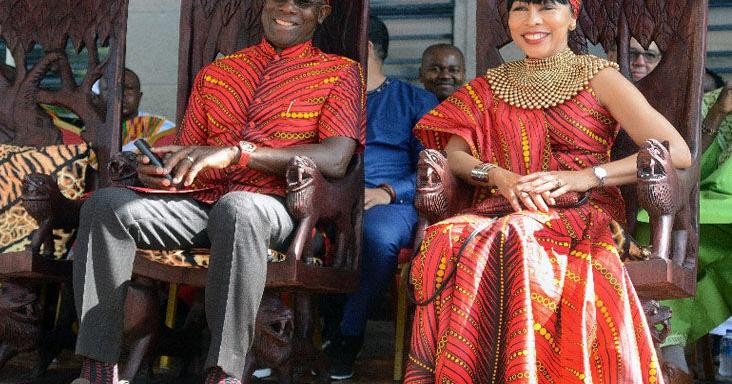
British royalty snubbed Trinidad and Tobago when the Prime Minister sent a letter asking for reparations to be discussed.
Prime Minister Dr Keith Rowley yesterday disclosed he had written to King Charles III about the issue, but never received a reply.
He was speaking at Emancipation celebrations yesterday at the Lidj Yasu Omowale Emancipation Village at the Queen’s Park Savannah in Port of Spain.
The Asantehene, King Otumfuo Osei Tutu II, was the guest of honour at the celebrations.
The Prime Minister noted that at the level of Caricom there is a committee to advance the cause of reparations to educate those who claim not to know, and who claim not to have a responsibility for the “African cultural holocaust”.
He recalled that he was in Barbados when King Charles III (then Prince Charles) was present as Barbados took the decision to become a Republic and break ties with Britain.
Rowley said in 1962 when Trinidad and Tobago attained Independence the country still had a “colonial master” as its head of state.
He said T&T became a Republic in 1976 as the country decided to “break that chain” and take responsibility for itself, thus becoming the independent Republic of Trinidad and Tobago. “I observed and I listened to British royalty attempting to apologise or accept responsibility for that piece of history,” he said.
Rowley said when he returned to Trinidad he took the opportunity to write to King Charles and the British Prime Minister pointing out to them that Caricom was having a conversation on reparations.
Rowley said in his letter he indicated that, given the statement made by King Charles in Barbados, it was a good time to also take on board the conversation and responsibility on reparations.
“Just to tell you where we are in this world, who we are in this world, I can tell you now, it must be the only time in the history of the British Commonwealth that a letter would have come from a Prime Minister to Buckingham Palace and to No 10 Downing Street and never got a response. Never for the courtesy of a reply because I raised African Emancipation and reparation with those who believe that it was their birthright and we were entitled to be enslaved,” he said.
“But today as we celebrate in Trinidad and Tobago in the presence of an African King whether they reply or they don’t reply we will move onward and upward in freedom, as free black people wherever we are anywhere in this world,” said Rowley.
African royalty in T&T
The Prime Minister emphasised the importance of the King’s visit.
“This is first time that we are having a visit of a royal blood relative from West Africa with a connection to us here in Trinidad and Tobago. This visit is different because it is a welcome home to us and a welcome to us from Africa from family. This is a family gathering taking place at Emancipation time in Trinidad and Tobago,” he said
Speaking earlier yesterday during the official start of the Emancipation Day procession in downtown Port of Spain, Rowley pointed out the importance of the King’s visit, especially to the younger generation, many of whom were witnessing and discovering, for the first time, the presence, stature and majesty of African royalty.
“Hopefully, from today, the word ‘their’ which implies something foreign, other, or of distant ownership, will be changed and we will begin to share, and embrace every aspect of both our lives as ‘Ours’- meaning that on both sides of the Atlantic, African people will see the ‘oneness’ that we carry within us. Then, we will be separated only by the narrowing waters of the Atlantic,” the Prime Minister said.
“Your Royal Highness, we in Trinidad and Tobago are indeed appreciative of this visit, and particularly at this time, as we commemorate the emancipation from African enslavement in 1838,” he added.
T&T on the world stage
Rowley said “in spite of Europe’s calculated attempts at dehumanising us, there was always resistance”.
“As CLR James, one of Trinidad and Tobago’s foremost literary figures concluded, African slaves fought back, powerfully, with the contents of their minds…the memories, the logic and resilience of their people,” he said.
“I speak proudly today that what James identified some 80 years ago years continues to be realised in the contributions of citizens of Trinidad and Tobago to the world stage.
“For example, we have created, and given the world our steelpan, our calypso, our soca music, which have gone on to influence other musical forms, even in Africa. We have done so, creating the world’s first gas-based economy, developed innovations in the oil industry; established the world-class Point Lisas Industrial Estate,” he noted.
The Prime Minister said, “We can cite our achievements in sport, literature, education, and many other fields, with our scholars occupying major positions around the world. We are also proud that, after serving on the UN Security Council at an earlier time, this September our country will assume the Presidency of the United Nations General Assembly.”
Turning to the King, Rowley said: “We, in Trinidad and Tobago, have not been that distant, to not have observed and pay homage to you, Your Royal Highness. We have recognised your personal background, your preparatory, early work, life and training in the UK and Canada and we acknowledge your achievements, particularly your Pillar of Peace Award, for the settlement of differences between two royal families and, of course, your Chancellorship of the Kwame Nkrumah University of Science and Technology.”
He also acknowledged that former prime minister Dr Eric Williams, “a colossal figure in the decolonisation period of the 1950s-60s, was a close friend and fellow traveller of your President Kwame Nkrumah.
“This, too, can be said of CLR James, whom I mentioned earlier, and also George Padmore, another distinguished son of this soil and a guide to Ghana’s independence. He was certainly one of the significant figures in the early Pan-African movement in London. We are proud to acknowledge and understand that Padmore’s name continues to be treated with its much-deserved respect in Ghana. The existence and featuring of the George Padmore Library in Accra is testimony of our long and trusted bonds.”
The Prime Minister added, “I will admit that I am personally interested in this aspect, with the hope that – along with the commercial prospects, in the hydrocarbon business, that have been discussed earlier -there could be some measure of continuous collaboration and exchange between your university, and our University of the West Indies, and the University of Trinidad and Tobago-as both of our regions continue to focus on the advancing technologies and other disciplines, in this, the 21st century.”
He noted that “historians on both sides of the Atlantic have written volumes on the tortuous experiences of our ancestors, who, in some parts of the Americas, were equated with animals in the fields, to be flogged, bought and sold and the idea of family was erased with extreme brutality.
“Enslavement over some 400 years meant not only dawn-to-dusk work in those fields, but a destruction of all of a slave’s cultural support – his or her personhood, their family systems, religion, music, art, language, etc. This being our lot, the concepts of ownership, asset and wealth were clearly not for us.”
The Prime Minister said: “One historian describes us, the descendants of the enslaved, as victims of the African ‘cultural holocaust’. Another historian suggests that there should be a ‘Middle Passage Plan’ for Africans, with Europe giving reparations to areas of the diaspora, similar to the re-construction designs of its ‘Marshall Plan’, after World War II,” he said.
He said people will be familiar with the continuing efforts and appeals in this area to the former European colonisers.
“Some, the direct beneficiaries of this holocaust, prefer to write new revisionist history to pretend that it didn’t happen, some pat us on the shoulder to say ‘let’s just move on, it couldn’t be all that bad’ and, most recently, boldfaced morons are now even suggesting that we should be grateful for the ‘benefits that were bestowed’ upon us by slavery through language and aculturisation,” he said.


